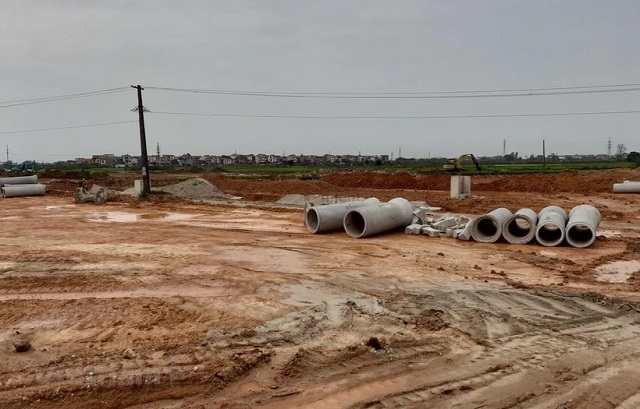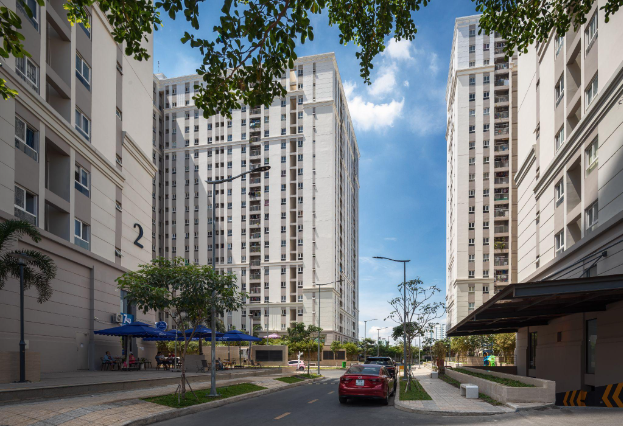
Numerous real estate enterprises, especially in Hanoi and Ho Chi Minh City, are currently facing significant obstacles related to land pricing issues. (Illustrative image. Source: Vietnam+)
|
Expressing concern over the fact that many real estate businesses are encountering substantial challenges regarding land valuation, Mr. Nguyen Quoc Hiep, Chairman of the Vietnam Construction Contractors Association, asserted that without timely intervention from authorities and the legal system, real estate prices, particularly for apartments, could continue to soar uncontrollably.
Apartments priced at 500 million VND per square meter are “unreasonable”
During a discussion with reporters on November 28 regarding land valuation, Mr. Hiep mentioned that recently, numerous real estate projects have experienced delays in investment and construction due to unresolved land pricing issues. Some projects have even reached completion but remain unsellable due to the absence of land valuation.
“A noticeable trend in the past few years is that most localities are perplexed about issuing land price lists and tend to wait and observe what others are doing. While the prescribed land prices are based on market rates (the average market price), the current approach leans towards auction prices (using the auction price of a small area as the market price for a larger area). This situation has caused many projects to come to a standstill, resulting in significant waste and market congestion,” Mr. Hiep worriedly shared.
More alarmingly, many localities are referencing Ho Chi Minh City’s extremely high land price list, and there is a general tendency to set land prices at exorbitant levels. According to Mr. Hiep, this high land valuation is driving up real estate prices, creating a “vicious cycle” between housing prices, land prices, businesses, and the market.
“There are projects where a six-month difference in valuation timing resulted in land prices doubling. Several apartment projects have reached prices of 500 million VND per square meter. These prices are unreasonable but stem from the high land valuation,” Mr. Hiep explained.
Mr. Hiep also pointed out that real estate prices in Vietnam are currently higher than in the region. “Without timely intervention from authorities and the legal system, real estate prices may continue to spiral upward without a ceiling. Vietnam’s real estate prices could become the highest in the world. When prices exceed the market’s acceptance level, and no one can afford to buy, real estate businesses may face the risk of collapse,” he expressed with concern.
From an economic perspective, Dr. Can Van Luc, Chief Economist of BIDV, concurred that the new principle of determining land prices based on market rates is the most crucial aspect, facilitating more accurate valuations that reflect market prices. This approach addresses the dual-price issue and serves as a foundation for compensation, site clearance, financial obligations to the state, real estate pricing, investment cost-effectiveness calculations, and clearly defining the responsibilities of involved parties.
However, Mr. Luc emphasized that aligning land prices more closely with market rates could lead to increased land use costs and higher real estate prices and rents compared to the previous land price lists. “It is anticipated that after the official implementation of the new land price lists in 2026, land prices in some localities may increase by 2 to 7 times compared to the current rates,” he noted.
Mr. Nguyen Van Dinh, Chairman of the Vietnam Real Estate Brokers Association, added that the announcement of new land price lists and planning by localities could directly influence real estate prices.
 Mr. Nguyen Quoc Hiep – Chairman of the Vietnam Construction Contractors Association. (Photo: PV/Vietnam+)
|
“There is a risk that land prices in some localities will be pushed to excessive levels, as the reality is that compensation and site clearance prices for projects in Hanoi and Ho Chi Minh City are already very high. This situation leads to increased investment costs and a sudden surge in product prices,” Mr. Dinh cautioned. He emphasized that if the issue of rising real estate prices is not addressed promptly, it will lead to numerous market and societal repercussions.
The Need for a Reasonable Land Valuation Process
To address this situation, Mr. Nguyen Quoc Hiep, Chairman of the Vietnam Construction Contractors Association, suggested that the Ministry of Natural Resources and Environment should pay attention to providing guidance on land valuation and creating land price lists that are well-founded, realistic, and suitable for each locality.
“In my opinion, land valuation should not be based on auction prices. For example, in Thanh Oai district, Hanoi, the local government should not use the extremely high land price from a recent auction as the market price for dozens or hundreds of hectares of adjacent land,” Mr. Hiep shared.
Additionally, Mr. Hiep mentioned that to meet the needs of homebuyers with varying financial capabilities and economic conditions, businesses should strive for reasonable selling prices and adjust market prices based on tax policies and infrastructure development.
Mr. Nguyen Van Dinh, Vice President of the Vietnam Real Estate Association and Chairman of the Vietnam Real Estate Brokers Association, agreed that the state needs to promptly implement supportive measures to “clear the path” for commercial housing projects aimed at the low-income segment, social housing, and provide additional recovery policies for the vacation real estate market.
Regarding the role of the Ministry of Construction, Mr. Hoang Hai, Director of the Department of Housing and Real Estate Market Management, suggested that to promote the safe, healthy, and sustainable development of the real estate market, it is necessary to amend, supplement, and promulgate new tax laws. This includes establishing higher tax rates for individuals or entities occupying large land areas or multiple residences, as well as those who fail to utilize their land promptly, in alignment with international practices and Vietnamese law.
Furthermore, localities should focus on resolving legal and procedural obstacles in investment preparation for real estate projects, accelerating the implementation of land-use right auctions and project investment approval through auctions, consent to investment principles, and investor selection. They should also determine land prices, calculate land use fees, transfer land, and lease it; streamline administrative procedures for real estate projects to increase market supply.
Hung Vo
















